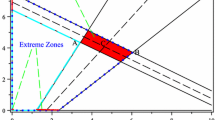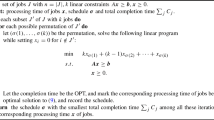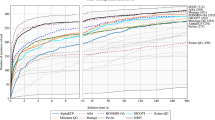Abstract
The knapsack problem is one of the basic problems in combinatorial optimization. In real-world applications it is often part of a more complex problem. Examples are machine capacities in production planning or bandwidth restrictions in telecommunication network design. Due to unpredictable future settings or erroneous data, parameters of such a subproblem are subject to uncertainties. In high risk situations a robust approach should be chosen to deal with these uncertainties. Unfortunately, classical robust optimization outputs solutions with little profit by prohibiting any adaption of the solution when the actual realization of the uncertain parameters is known. This ignores the fact that in most settings minor changes to a previously determined solution are possible. To overcome these drawbacks we allow a limited recovery of a previously fixed item set as soon as the data are known by deleting at most k items and adding up to ℓ new items. We consider the complexity status of this recoverable robust knapsack problem and extend the classical concept of cover inequalities to obtain stronger polyhedral descriptions. Finally, we present two extensive computational studies to investigate the influence of parameters k and ℓ to the objective and evaluate the effectiveness of our new class of valid inequalities.
Similar content being viewed by others
References
Achterberg T.: SCIP: solving constraint integer programs. Math. Prog. Comp 1(1), 1–42 (2009)
Aissi, H., Bazgan, C., Vanderpooten, D.: Min-max and min-max regret versions of some combinatorial optimization problems: a survey. http://hal.archives-ouvertes.fr/docs/00/15/86/52/PDF/AN7LAMSADE_1-32.pdf (2007)
Balas E.: Facets of the knapsack polytope. Math. Prog 8, 146–164 (1975)
Beasley, J.E.: OR-Library: distributing test problems by electronic mail. J. of the OR Society 41: 1069–1072. http://people.brunel.ac.uk/~mastjjb/jeb/ (1990)
Bellman R.: Notes on the theory of dynamic programming iv—maximization over discrete sets. Naval Res. Logist. Quart. 3, 67–70 (1956)
Bertimas D., Sim M.: Robust discrete optimization and network flows. Math. Prog. Ser. B 98, 49–71 (2003)
Bertimas D., Sim M.: The price of robustness. Oper. Res 52, 35–53 (2004)
Büsing, C., Koster, A.M.C.A., Kutschka M.: Recoverable robust knapsacks: the discrete scenario case. Technical Report 018-2010, TU Berlin. http://www.math.tu-berlin.de/coga/publications/techreports/2010/ (2010)
Crowder H., Johnson E., Padberg M.: Large-scale zero-one linear programming problems. Oper. Res. 31, 803–834 (1983)
Cicerone S., D’Angelo G.D., Di Stefano G., Frigioni D., Navarra A., Schachtebeck M., Schöbel A.: Recoverable robustness in shunting and timetabling Robust and Online Large-Scale Optimization, vol. 5868 of LNCS, 28–60. Springer, Berlin (2009)
Fischetti M., Lodi A., Salvagnin D.: Just MIP it!. Ann. Inf. Syst. 10, 39–70 (2009)
Gabrel V., Minoux M.: A scheme for exact separation of extended cover inequalities and application to multidimensional knapsack problems. OR Lett. 30, 252–264 (2002)
Iida H.: A note on the max- min 0-1 knapsack problem. J. Comb. Opt. 3, 89–94 (1999)
Kalai, R., Vanderpooten, D.: Lexicographic α-robust knapsack problems: complexity results. IEEE International Conference on Services Systems and Service Managment 1103–1107 (2006)
Kaparis K., Letchford A.: Separation algorithms for 0-1 knapsack polytopes. Math. Prog. 124(1-2), 69–91 (2010)
Karp, R.: Reducibility among combinatorial problems. Complexity of Computer Computations. 85–103 (1972)
Kellerer H., Pferschy U., Pisinger D.: Knapsack Problems. Springer, (2004)
Klopfenstein, O., Nace, D.: Valid inequalities for a robust knapsack polyhedron—Application to the robust bandwidth packing problem. Networks Special Issue, Network Optimization (INOC 2009) (to appear)
Liebchen C., Lübbecke M.E., Möhring R.H., Stiller S.: The concept of recoverable robustness, linear programming recovery, and railway applications Robust and Online Large-Scale Optimization, vol 5868 of LNCS, 1–27. Springer, Berlin (2009)
Martello, S., Toth, P.: Knapsack problems: algorithms and computer implementations. Wiley (1990)
Weismantel R.: On the 0-1 knapsack polytope. Math. Prog. 77, 49–68 (1997)
Wolsey L.: Faces for a linear inequality in 0-1 variables. Math. Prog. 8, 165–178 (1975)
Yu G.: On the max- min 0-1 knapsack problem with robust optimization applications. Oper. Res. 44, 407–415 (1996)
Author information
Authors and Affiliations
Corresponding author
Additional information
This work was supported by the Federal Ministry of Education and Research (BMBF grant 03MS616A, project ROBUKOM - Robust Communication Networks, www.robukom.de), and the DFG Research Center Matheon Mathematics for key technologies.
Rights and permissions
About this article
Cite this article
Büsing, C., Koster, A.M.C.A. & Kutschka, M. Recoverable robust knapsacks: the discrete scenario case. Optim Lett 5, 379–392 (2011). https://doi.org/10.1007/s11590-011-0307-1
Received:
Accepted:
Published:
Issue Date:
DOI: https://doi.org/10.1007/s11590-011-0307-1




